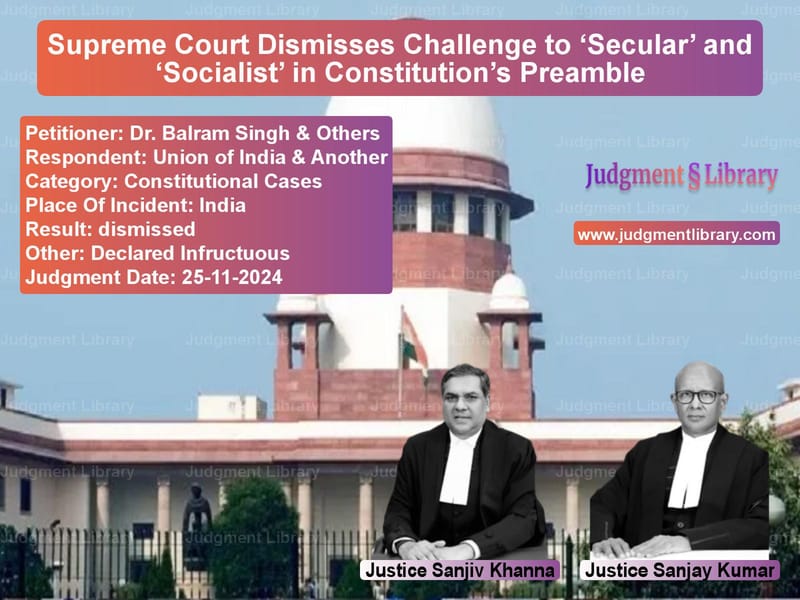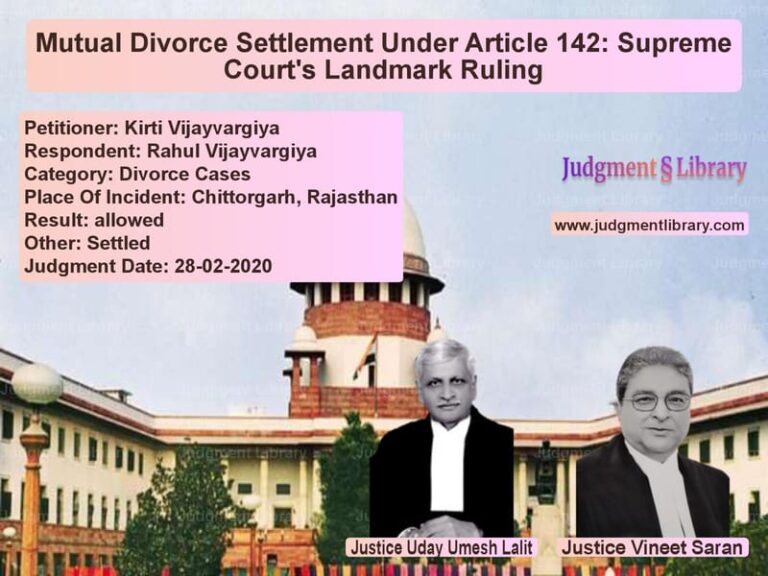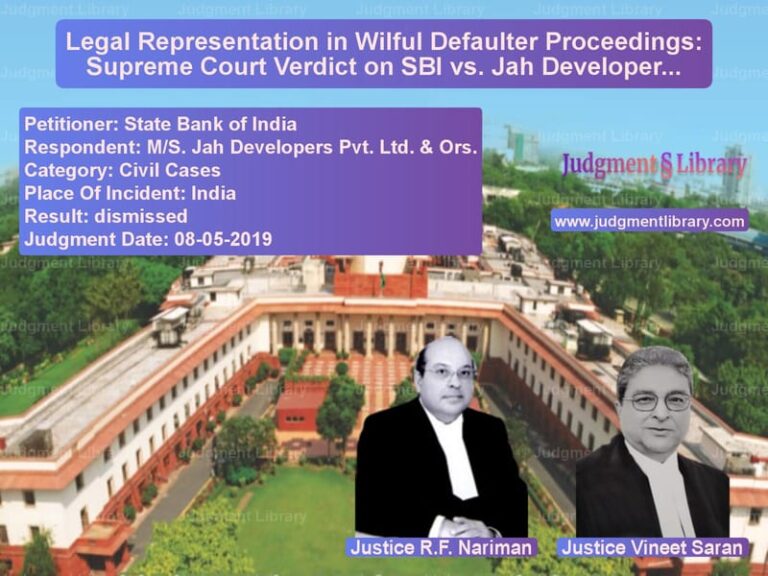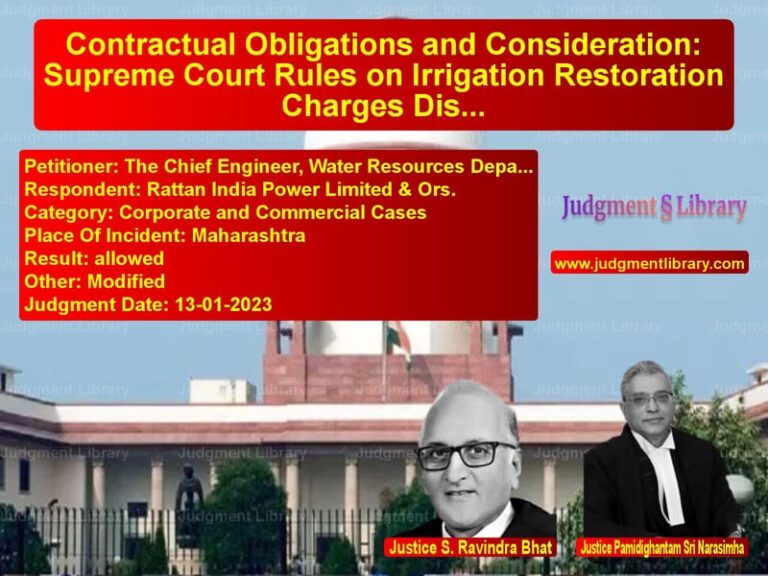Supreme Court Dismisses Challenge to ‘Secular’ and ‘Socialist’ in Constitution’s Preamble
The Supreme Court of India recently delivered a decisive ruling in Dr. Balram Singh & Others v. Union of India & Another, rejecting a challenge to the inclusion of the words ‘socialist’ and ‘secular’ in the Preamble of the Indian Constitution. The challenge was primarily based on the argument that these terms were inserted through the 42nd Constitutional Amendment Act of 1976 during the Emergency period and were never part of the original intent of the Constituent Assembly.
The Court dismissed the petitions outright, asserting that the challenge lacked merit, particularly given that the amendment had remained unchallenged for 44 years. The ruling reaffirmed that these terms do not impose specific economic policies or restrict religious freedoms but instead reinforce fundamental constitutional principles.
Background of the Case
The petitions challenged the insertion of the words ‘socialist’ and ‘secular’ into the Preamble through the 42nd Amendment Act, 1976. The key arguments raised by the petitioners were:
- The amendment was enacted during the Emergency, after the tenure of the Lok Sabha had officially ended in March 1976, making it constitutionally invalid.
- The word ‘secular’ was deliberately omitted by the Constituent Assembly, indicating that it was never intended to be part of the Constitution.
- The term ‘socialist’ imposes a particular economic ideology on elected governments, thereby limiting their policy choices.
- The retrospective application of these amendments distorts historical accuracy since the Constitution was formally adopted in 1949 without these words.
The petitioners argued that these amendments were made without proper democratic approval and sought their removal from the Preamble.
Supreme Court’s Observations
The Supreme Court categorically rejected the challenge, stating that:
- Article 368 of the Constitution grants Parliament the power to amend any part of the Constitution, including the Preamble.
- The fact that the terms ‘socialist’ and ‘secular’ were not initially included does not prevent their later inclusion through legitimate constitutional amendments.
- Secularism, even before its explicit mention in the Preamble, was already embedded in constitutional provisions such as Articles 14, 15, 16, 25, and 26, which guarantee religious freedom and prohibit discrimination.
- Multiple Constitution Bench judgments, including Kesavananda Bharati v. State of Kerala (1973) and S.R. Bommai v. Union of India (1994), have established that secularism is a fundamental feature of the Constitution.
- The term ‘socialism’ does not mandate a specific economic model but ensures that the State remains committed to social and economic justice.
The Court emphasized that constitutional amendments are legitimate as long as they do not violate the basic structure of the Constitution, which was not the case here.
Key Arguments by the Parties
Petitioner’s Arguments (Dr. Balram Singh & Others):
- The 42nd Amendment was passed during the Emergency by an extended Parliament, making it unconstitutional.
- The original Constitution did not include ‘socialist’ and ‘secular,’ proving that these terms were never intended to be part of India’s foundational principles.
- The inclusion of ‘socialism’ restricts economic policy choices for future governments, violating democratic freedoms.
- Secularism was omitted from the original Preamble because it was deemed unnecessary by the Constituent Assembly.
Respondent’s Arguments (Union of India):
- Article 368 allows amendments to the Preamble, provided they do not alter the basic structure of the Constitution.
- Even before the 42nd Amendment, secularism was already an integral part of India’s constitutional framework.
- The term ‘socialism’ in the Indian context does not impose a rigid economic system but ensures social justice and equitable opportunities.
- The challenge is being raised after 44 years, rendering it untenable.
Supreme Court’s Final Judgment
The Supreme Court unequivocally dismissed the petitions, stating:
- The power to amend the Constitution, including the Preamble, is vested in Parliament under Article 368.
- The retrospective argument against the 42nd Amendment is flawed since constitutional amendments apply to the document as a whole, irrespective of when they are made.
- The inclusion of ‘secular’ and ‘socialist’ aligns with the principles already enshrined in various constitutional provisions and Supreme Court judgments.
- The petitioners failed to establish how these amendments violate the basic structure of the Constitution.
- The lapse of 44 years since the amendment was enacted makes the challenge meritless.
The Court stated:
“The Constitution is a living document, and amendments made through a legitimate process cannot be questioned merely on the basis of historical intent. The words ‘socialist’ and ‘secular’ only reaffirm what was already a part of the constitutional ethos.”
Impact and Significance
The Supreme Court’s ruling reinforces the stability of India’s constitutional framework and upholds the validity of the 42nd Amendment. Key takeaways from the judgment include:
- Constitutional amendments must align with the basic structure doctrine but can evolve over time to reflect societal changes.
- Secularism remains a fundamental feature of the Indian Constitution, ensuring religious neutrality by the State.
- Socialism, as interpreted by the Court, does not impose economic restrictions but promotes social and economic justice.
- Challenges to long-standing amendments are unlikely to succeed unless they demonstrate clear constitutional violations.
Conclusion
The Supreme Court’s decision in this case sets a strong precedent against belated challenges to constitutional amendments. By reaffirming the validity of ‘socialist’ and ‘secular’ in the Preamble, the ruling ensures that the foundational principles of the Indian Constitution remain intact and immune from political or ideological reinterpretation. This judgment cements India’s commitment to a balanced approach to governance, where economic policies remain flexible and religious freedoms are protected under a secular framework.
Petitioner Name: Dr. Balram Singh & Others.Respondent Name: Union of India & Another.Judgment By: Justice Sanjiv Khanna, Justice Sanjay Kumar.Place Of Incident: India.Judgment Date: 25-11-2024.
Don’t miss out on the full details! Download the complete judgment in PDF format below and gain valuable insights instantly!
Download Judgment: dr.-balram-singh-&-o-vs-union-of-india-&-ano-supreme-court-of-india-judgment-dated-25-11-2024.pdf
Directly Download Judgment: Directly download this Judgment
See all petitions in Fundamental Rights
See all petitions in Constitution Interpretation
See all petitions in Legislative Powers
See all petitions in Public Interest Litigation
See all petitions in Separation of Powers
See all petitions in Judgment by Sanjiv Khanna
See all petitions in Judgment by Sanjay Kumar
See all petitions in dismissed
See all petitions in Declared Infructuous
See all petitions in supreme court of India judgments November 2024
See all petitions in 2024 judgments
See all posts in Constitutional Cases Category
See all allowed petitions in Constitutional Cases Category
See all Dismissed petitions in Constitutional Cases Category
See all partially allowed petitions in Constitutional Cases Category







